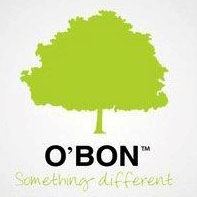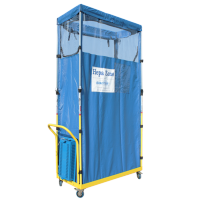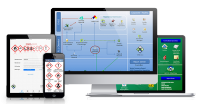Services
Healthcare Settings Accreditation Consultancy Services
Environmental Infection Control and Safety Consultancy Services
Emergency Response Consultancy Service
Corporate Social Responsibility and Sustainability Services
Environmental Professional Fellowship Program
BIM Services
Food Safety/HACCP Consulting Services
Our Partners
 |
 |
 |
 |

One-day Workshop
Material requirements planning is a set of techniques that uses bill of material data, inventory data and the master production schedule to calculate requirements for materials. Time-phased MRP begins with the items listed on the master production schedule (MPS) and determines (1) the quantity of all components and materials required to fabricate those items, and (2) the date that the components and material are required. Time-phased MRP is accomplished by exploding the bill of material, adjusting for inventory quantities on hand or on order, and offsetting the net requirements by the appropriate lead times.
This one-day workshop will focus on Basics of MRP and Managing with MRP.
Basics of MRP
This session will explore the basics of operating MRP Topics discussed include:
- Objectives and functions of MRP
- Inventory replenishment techniques and MRP
- Inputs to MRP
- The MRP grid
- Time-phasing
- Bills of material
- MRP calculations
- Outputs of MRP
Managing with MRP
This session continues the discussion on MRP with an in-depth review of the role and activities performed by the MRP planner. Topics discussed include:
- Exploding through multiple bill-of-material (BOM) levels
- Keeping demand and supply in balance over the planning horizon
- Releasing production and purchase orders
- Monitoring order statuses
- Identifying, negotiating and resolving conflicts
- Performance measurements used to determine the planner’s effectiveness in managing the demand and supply orders.
Source: Principles of Manufacturing Management, sessions 4 & 5
Potential Audience
This workshop may be of interest to: master schedulers, material planners, production planners, materials coordinators, buyers, middle management.

One-day Workshop
Sales and operations (S&OP) plans deal with aggregate planning values, such as product families and productive resources, extending over long-range planning horizons. In contrast, master scheduling deals with the actual end-products or finished goods that he company makes and sells, planned over the medium-term time frame. The master schedule is the translation of the sales and operations plan into specific products with their quantities and timing determined.
This one-day workshop will focus on the master scheduling foundations and processes.
Master Scheduling Foundations
Master Scheduling Foundations discusses the steps necessary to convert the production plan for product families coming from sales and operations planning (S&OP) into a schedule of end products. Topics discussed:
- Major influences on master scheduling
- Fundamental calculation and techniques used in developing the master schedule
- Using order promising, time fences and zones
- Generating MPS planned replenishment orders.
Master Scheduling Processes
Master Scheduling Processes continues the discussion on master scheduling with a review of the role and activities performed by the master scheduler. The discussion on master schedule management will center on the various steps necessary for effective schedule maintenance. Topics discussed:
- Demand orders
- Time fences
- Planned orders
- Safety stock
- Action messages
- Rough-cut capacity planning management
- Performance measurements used to determine the effectiveness of the master scheduler in schedule maintenance.
Source: Principles of Operations Planning, sessions 8 & 9
Potential Audience
This workshop may be of interest to: master schedulers, material planners, production planners, materials coordinators, buyers, middle management.

One-day Workshop
Lean has emerged as a philosophy preaching the total elimination of waste and the optimization of productive resources, a toolbox of techniques for process improvement, and a system through which companies and their business partners can deliver continuous improvement and customer satisfaction. This one-day workshop will focus on Lean Production Management and Lean Inventory.
Lean Inventory – Theory and Practice
Lean Inventory – Theory and Practice is concerned with the investigation of inventory from a different perspective: the application of lean principles and practices. Topics discussed include:
- Concepts of just-in-time (JIT) and lean and how they apply to the management of inventories
- The structure of lean
- Three major sources of operations waste
- Eight types of process waste
- Differentiating value-added work from waste
- Managing inventory effectively in a lean environment
- Lean inventory flow analogy
- Impact of inventory reduction
- Lean pull system basics
- Working with KanBan
Lean Production Management
Lean uses visual demand pull signals, such as KanBan cards, instead of orders. Only when the demand signal is activated, will operators build and move items and products as designated by the KanBan. Topics discussed include:
- Lean and just-in-time (JIT) concepts and practices
- Evolution of the lean concept
- Concept of process waste
- Lean thinking
- Employee involvement and empowerment
- Lean production concepts and practices
- Lean plant layout design
- Lean production pull system
- Kanban production techniques
- Two-card KanBan production flow
Source: Principles of Inventory Management, session 7 Principles of Manufacturing Management, session 10
Potential Audience
This workshop may be of interest to: material planners, material coordinators, production planners, buyers, middle management

One-day Workshop
Managing inventories is a very important task. Inventories account for an enormous portion of a firm’s cash expenditure, ranging anywhere from 10 percent to as high as 60 percent or more. Failure to effectively manage inventories can result in excess costs that drag down company profitability and create mismatches between what is available and what customers really want. This one-day workshop will focus on the purpose and function of inventory and inventory replenishment management.
Fundamentals of Inventory Management
Almost all businesses deal in some way or another with inventory. Manufacturers and distributors must efficiently manage the ordering, receiving, storing, tracking and selling of inventories of raw materials, components, and finished goods. Topics discussed:
- Inventory management objectives
- What inventory management does
- Different classes of inventory
- Different levels of inventory management
- Characteristics of inventory in the supply chain
- Strategic inventory management process
- Demand and supply objectives
- Conflicting objectives of inventory management and trade-off decisions
- Inventory and demand flows
- Inventory dynamics
- Financial impact of inventory management
Inventory Replenishment Management
Inventory represents perhaps the single largest investment made by the typical company. Effectively managing inventory enables companies to maximize company profits by maximizing customer service, minimizing operations costs, and minimizing inventory investment. Topics discussed:
- Components of inventory replenishment management
- Principles of inventory replenishment
- Inventory replenishment ordering techniques
- Calculating safety stock
- Calculating standard deviation
- Determining order quantities
- Order and inventory carrying cost components
- Economic order quantity
- Inventory replenishment planning process
Source: Principles of Inventory Management, sessions 3 & 4
Potential Audience
This workshop may be of interest to: material planners, material coordinators, production planners, buyers, sales and marketing, middle management
About Green Health Canada Inc.
Green Health Canada Inc. is a Canadian company dedicated to directly assist governments and communities in their efforts to maintain sustainable systems, secure optimal public health, and ensure an acceptable quality of life remains available to all people..... read more
Services
- Healthcare Settings Accreditation Consultancy Services
- Environmental Infection Control and Safety Consultancy Services
- Emergency Response Consultancy Service
- Corporate Social Responsibility and Sustainability Services
- Environmental Professional Fellowship Program
- BIM Services
- Food Safety/HACCP Consulting
© 2024 Design & Developed by BDSOURCE














